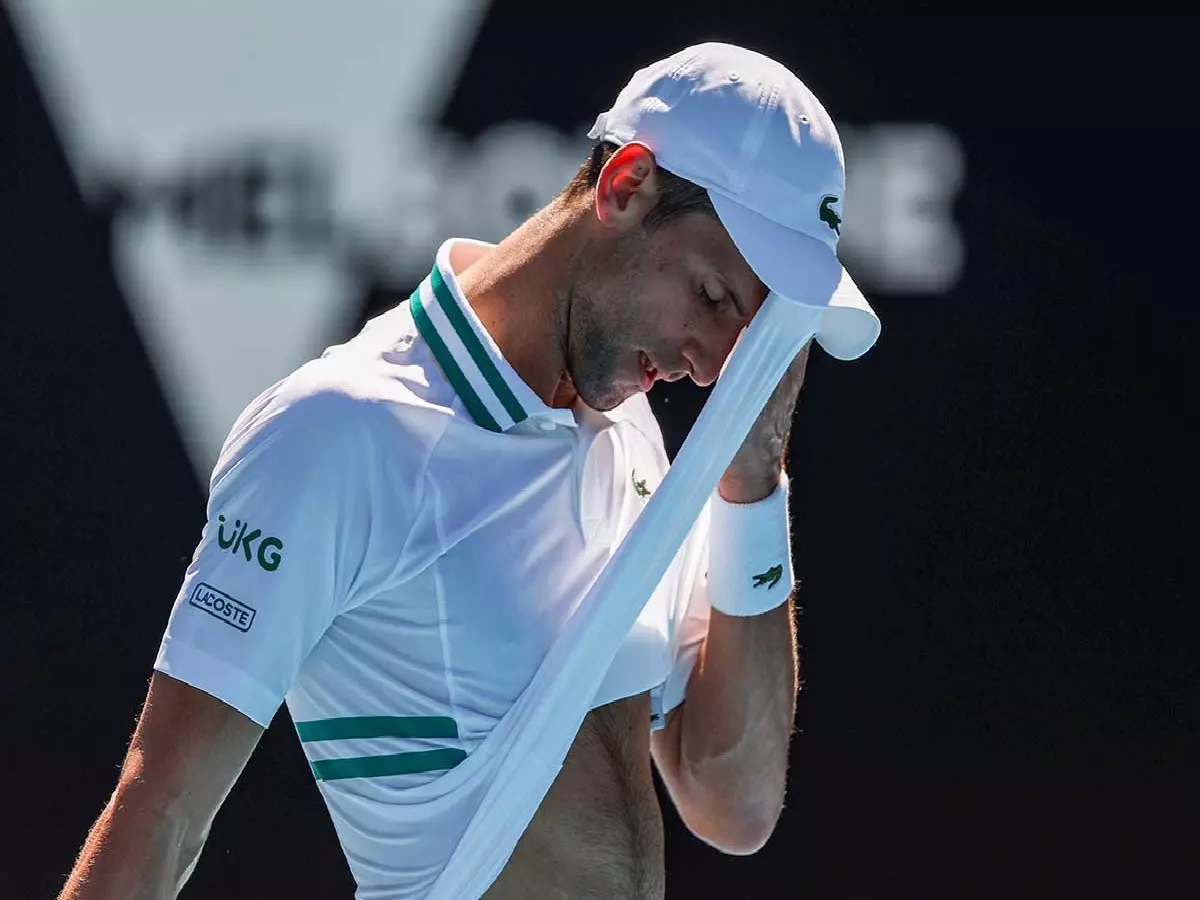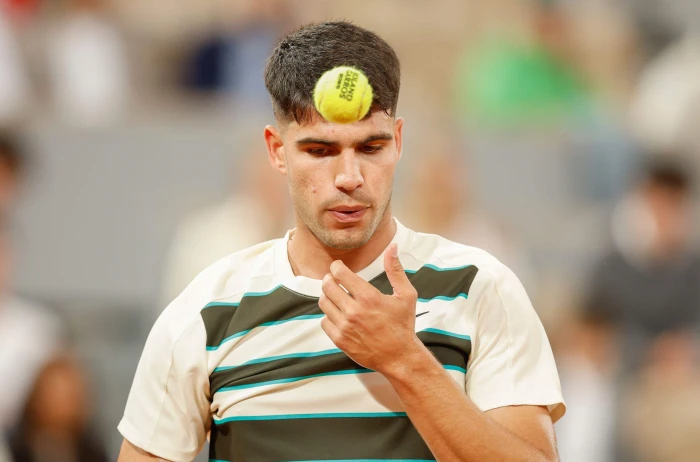Novak Djokovic deported: How did world number one end up in such a mess?

Novak Djokovic 'extremely disappointed' to be deported from Australia
As tennis' top stars prepare for the Australian Open, the best player in the world is on his way home after being deported from the country. How on earth did we get to this?
The world No. 1 travelled to Melbourne believing he had an exemption from the vaccination requirement to enter the country, only for Australian Border Force to cancel his visa upon arrival.
It's a story that has been brewing for weeks and can be a complicated follow, so here we run you through the full timeline of events and look at how on earth it came to this.
Australian Open announce vaccination policy
In mid-November, the Australian Open revealed they would require all participating players to be fully vaccinated.
It followed what was a farcical 2021 tournament in which players had to complete a two-week quarantine period that was messy to say the least.
To avoid a repeat and to appease a government strict on public health protocols, Tennis Australia chief Craig Tiley agreed to the vaccination policy.
'There is no loophole'
On December 9, and with Djokovic still refusing to publicly discuss his vaccination status or plans, Tiley appeared on Australian television with an update.
This was the first time an 'exemption' policy was suggested in any real detail.
ATP Cup withdrawal
The world No. 1, who is passionate about representing Serbia in team events and had done so at the Davis Cup just weeks earlier, announced he was pulling out of the ATP Cup in Sydney.
The following day, he was videoed practicing in Spain with official Australian Open balls, suggesting he was still planning on playing the first Grand Slam of the year.
'Medical exemptions granted'
This was when he confirmed there would be unvaccinated players at the tournament but only after they had gone through a rigorous medical exemption application process first.
'I'm heading Down Under'
Fellow Brit Liam Broady also seemed put out by the news, posting on social media: "The second AO announced there would be exemptions we all knew."
'Next plane home…'
Following the the Australian public and media's angry outcry at Djokovic's exemption, Aussie Prime Minister Scott Morrison felt the need to get involved.
For some analysts, this was a telling moment. There is an election coming up in Australia and many Djokovic supporters believe he is using the public outcry to make the Serbian political collateral in his re-election campaign.
"Any individual seeking to enter Australia must comply with our border requirements," Morrison said.
Novak Djokovic will be "on the next plane home" if he is unable to provide "acceptable proof" for a COVID vaccination exemption to play at the Australian Open, the country's prime minister has warned.https://t.co/4mPb75dCHi pic.twitter.com/XuFSiTlqwM
— Sky News (@SkyNews) January 5, 2022
Detained at airport
Instead, he was detained in isolation while his documentation to validate his exemption was examined.
As the hours passed it soon became clear something major was happening. Five hours in, Djokovic's father Srdan took to Serbian television to call on people to "take the fight to the streets" if his son was not freed immediately.
'Held captive' in immigration detention hotel and comparison to plight of Jesus
By now there were plenty others who'd had their say. Morrison again backed the decision to deport Djokovic, while health secretary Greg Hunt confirmed Djokovic had failed to provide sufficient proof of grounds for medical exemption.
Djokovic's father:
— Based Serbia (@SerbiaBased) January 6, 2022
"The whole free World together with Serbia should rise, this isn't a battle for Serbia or Novak, it is a battle for 7 billion people".pic.twitter.com/o5lX3902qm
"Our Novak is being held captive," he raged. "Scott Morrison dared to attack Novak and expel him, but he did not even enter their country.
Novak Djokovic's mother comments on her son, who is at an immigration facility in Australia as he awaits a hearing challenging the rejection of his visa.
— The Recount (@therecount) January 6, 2022
"They are keeping him as a prisoner. It's just not fair. It's not human." pic.twitter.com/qSf9Xpfgrz
However, defenders of the Australian stance say he is merely being treated the same as anyone else who enters the country illegally and he is, essentially, free to take a flight out of Australia whenever he chooses.
Fans are protesting outside the Melbourne hotel where Novak Djokovic is being detained, pending the results of an appeal against the cancellation of his visa to play at the Australian Open. pic.twitter.com/OJmAGyjD3k
— talkRADIO (@talkRADIO) January 6, 2022
A costly misunderstanding?
This is Djokovic at Melbourne Airport last night. I have spoken to the man who took this photo. He says Novak showed a bundle of papers to Border Force with Tennis Australia logos on it. It feels to me Djokovic legitimately felt like he had an exemption thanks to TA. @2GB873 pic.twitter.com/uOtSYyBOR7
— Chris O'Keefe (@cokeefe9) January 6, 2022
Two letters to Craig Tiley have emerged from the Australian Ministry for Health from as far back as November making it clear that a previous COVID infection would not circumvent the Federal vaccination requirement to enter the country.
Letters from November, from the feds to Tennis Aus... pic.twitter.com/5zn6miDQoM
— KB ? (@chdyctt) January 6, 2022
It wasn't just Djokovic, either. Czech doubles player Renata Voracova was deported on the same grounds. She was in the country under the same invalid exemption Djokovic is claiming.
Tennis Australia, meanwhile, told the Sydney Herald and Sun that they completely reject suggestions that players were "knowingly misled".
Successful appeal
Damaging revelations, admissions, and apologies
Visa cancelled for a second time
BREAKING:
— Ben Rothenberg (@BenRothenberg) January 14, 2022
Alex Hawke, the Australian Minister for Immigration, has cancelled Novak Djokovic's Australian visa "on the basis that it was in the public interest to do so."
This is effectively a re-deportation order for the unvaccinated nine-time #AusOpen champion. pic.twitter.com/2P611AbUiw
Shifting sands beneath Djokovic
It was always going to be a considerably more difficult case to win for Djokovic than the initial appeal, mainly because the defence team had been backed into a corner.
They were no longer be able to fight on the procedural grounds that were successful before with his case hinging instead on convincing three Federal judges the government had not aplied reason totheir decision.
That was always going to be tough given the wording in the section of the law itself, which says Hawke only needed to show his judgement 'maybe' had merit.
The State essentially claimed that leniency with Djokovic would undermine the Australian pro-vaccination message and risked fuelling an anti-vaccination movement in the country.









